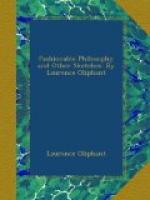“There is no such thing as subjectivity apart from objectivity. Mr Sinnett very properly tells you ’that occult science regards force and matter as identical, and that it contemplates no principle in nature as wholly immaterial. The clue to the mystery involved,’ he goes on to say, ’lies in the fact, directly cognisable by occult experts, that matter exists in other states than those which are cognisable by the five senses;’ but it does not become only cognisable subjectively on that account. You know very well, as an old mahatma, that you can cognise matter now with your sixth sense as well as with your five while in a perfectly normal condition, that you could not cognise except in trance-conditions before, and which even then you could only cognise incorrectly. The much-vaunted sixth sense of mahatmas needs sharpening as much as their logic, for you can no more separate subjectivity from objectivity than you can separate mind from matter. Christians, if they desire it, have a right to a heaven of subjective bliss, because they consider that they become immaterial when they go there; but Buddhists, who admit that they are in a sense material while in devachan or nirvana, and deny that their consciousness in that condition is in the same sense objective as well as subjective, talk sheer nonsense.” Ushas used a stronger expression here, but out of consideration for my old mahatma friends, I suppress it.
“‘Devachan’, says our Guru—speaking through his disciple in order to escape from this dilemma—’will seem as real as the chairs and tables round us; and remember that above all things, to the profound philosophy of occultism, are the chairs and tables, and the whole objective scenery of the world, unreal and merely transitory delusions of sense.’ If, as he admits, they are material, why should they be more unreal than the chairs and tables in devachan, which are also material, since occult science contemplates no principle in nature as wholly immaterial? The fact is, that there is no more unreal and transitory delusion of sense than those ‘states’ known to the adepts as devachan or nirvana; they are mere dreamlands, invented by metaphysicians, and lived in by them after death—which are used by them to encourage a set of dreamers here to evade the practical duties which they owe to their fellow-men in this world. ‘Hence it is possible,’ says our author, ’for yet living persons to have visions of devachan, though such visions are rare and only one-sided, the entities in devachan, sighted by the earthly clairvoyant, being quite unconscious themselves of undergoing such observation.’ This is an erroneous and incorrect assumption on the Guru’s part. ’The spirit of the clairvoyant,’ he goes on, ’ascends into the condition of devachan in such rare visions, and thus becomes subject to the vivid delusions of that existence.’ Vivid delusions indeed, the fatal consequences of which




